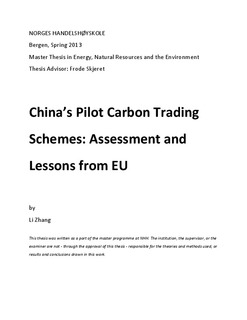China’s pilot carbon trading schemes : assessment and lessons from EU
Master thesis
Permanent lenke
http://hdl.handle.net/11250/169877Utgivelsesdato
2013Metadata
Vis full innførselSamlinger
- Master Thesis [4372]
Sammendrag
This
paper
assesses
the
seven
Chinese
pilot
carbon
schemes
that
will
be
implemented
in
late
2013,
and
relates
the
most
critical
and
relevant
lessons
from
the
European
Union’s
Emission
Trading
Scheme
(EU
ETS)
to
the
Chinese
circumstances.
This
paper
reviews
the
key
policy
designs
of
the
pilot
schemes,
and
discusses
the
unique
Chinese
policies
and
market
environment
that
would
differentiate
the
Chinese
schemes
from
the
EU
ETS.
In
terms
of
expected
emission
abatement,
this
paper
estimates
that,
compared
to
business
as
usual
(BAU)
level,
Guangdong,
Hubei
and
Shanghai
are
expected
to
mitigate
the
highest
amount
of
CO2
emissions.
In
terms
of
carbon
price,
this
paper
expects
the
schemes
of
Guangdong
and
Hubei
to
have
the
highest
carbon
price
while
the
price
in
Beijing
and
Tianjin
will
be
the
lowest.
By
reviewing
EU’s
experience,
this
paper
proposes
recommendations
on
1)
avoiding
allowances
over-‐supply
and
windfall
profits,
2)
maintaining
market
stability,
3)
bottom-‐level
allocation,
4)
use
of
allowance
reserve
and
provision,
and
5)
sector
selection
and
allocation.
The
paper
finds
that
the
unique
designs
of
the
Chinese
pilot
schemes
indicate
a
lower
likelihood
of
price
crash
than
EU
ETS.
With
regard
to
these
special
designs,
and
the
size
of
the
Chinese
pilot
schemes,
the
paper
concludes
that
the
Chinese
pilot
schemes
have
a
significant
global
implication
in
terms
of
promoting
a
global-‐wide
ETS,
reforming
existing
ETS
and
setting
examples
for
developing
countries.
